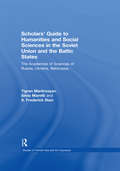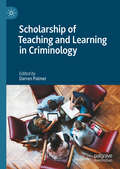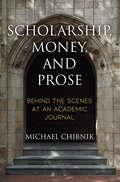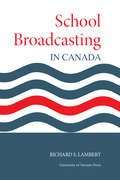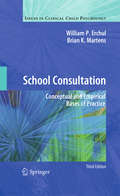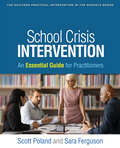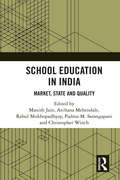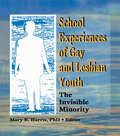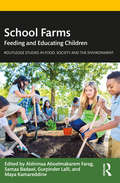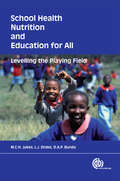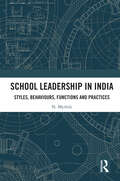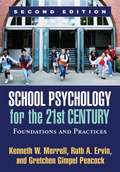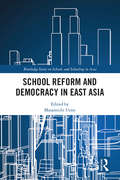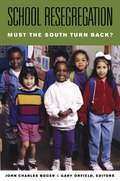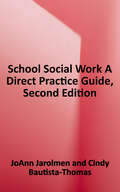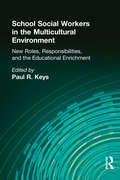- Table View
- List View
Scholars' Guide to Humanities and Social Sciences in the Soviet Union and the Baltic States: The Academies of Sciences of Russia, Ukraine, Belorussia, Moldova, the Transcaucasian and Central Asian Republics and Estonia, Latvia and Lithuania (Studies of Central Asia and the Caucasus)
by S. Frederick Starr Tigran Martirosyan Silvia MarettiIn the years since the first edition of the "Guide" was published, the research institutions of the academies of sciences of the USSR and the republics have undergone several, sometimes radical, reorganizations and reaffiliations. This guide to academy institutions supplies names, addresses, and historical, research, and organizational profiles for each institution, with summary information on staffing, current projects, special facilities, and libraries. The end of the Cold War has brought with it many changes of attitude and policy in the political arena; however, nowhere has change been so emotionally charged as in the area of politically-based emigration. Refugee policy is the driving force behind many of today's headlines, influencing both foreign and domestic policy. In Desperate Crossings, authors Norman L. and Naomi Flink Zucker chronicle and analyze the phenomenon of mass escape that began with the Haitians, but exploded into the American consciousness in the spring of 1980 with the Mariel boatlift and the subsequent mass exodus from Central America, and was most recently manifested in the Haitian and Cuban exoduses of 1994. In a compelling and carefully documented narrative, they identify the troika of interests - foreign policy, domestic pressures, and costs - that have controlled and determined the American response to refugees since before the Second World War, continuing until today. Desperate Crossings concludes by proposing a comprehensive and politically palatable approach to future refugee flows, both in our hemisphere and for the world community-at-large - including Europe and Asia. The authors suggest how, by changing the course of its refugee policies and programs, the United States can better respond to both the needs of refugees and the demands of its citizens.
Scholarship of Teaching and Learning in Criminology
by Darren PalmerThis book is the first dedicated collection aimed at examining teaching and learning issues within criminology. This collection of essays identifies how criminological practices are being shaped by larger developments and changes within the field of scholarship on teaching and learning. Changes include an increased university focus on ‘good teaching’ rankings and the associated emphasis on the professional development of teaching staff in order to shape them. In the past decade government funding for teaching and learning awards, and the move to sector funding on the basis of ‘good teaching’ outcomes (student satisfaction, completion rates, etc.), have further fostered developments in teaching and learning practices and the associated scholarship. However, criminology lags behind in responding to these changes. Scholarship of Teaching and Learning in Criminology aims to fill this gap by examining teaching practices in the hope of fostering a new generation of publications dedicated to scholarship on teaching and learning within the field.
Scholarship, Money, and Prose: Behind the Scenes at an Academic Journal
by Michael ChibnikAn illuminating guide to publishing a scholarly journal written by a former editor-in-chiefAmerican Anthropologist is the flagship journal of the American Anthropological Association, published quarterly, reaching more than 12,000 readers with each issue and representing four distinct subfields. The journal publishes articles that add to, integrate, synthesize, and interpret anthropological knowledge; commentaries and essays on issues of importance to the discipline; and reviews of books, films, sound recordings, and exhibits. From 2012 to 2016, Michael Chibnik was editor-in-chief of American Anthropologist. In Scholarship, Money, and Prose, he writes a candid account of the complex and challenging work entailed in its production.Providing detailed ethnographic and historical descriptions of the operations of a major journal and behind-the-scenes anecdotes of his experiences, Chibnik makes transparent the work of an editor-in-chief. He reveals how he assembled diverse materials, assessed contradictory peer reviews of manuscripts submitted for publication, and collaborated with authors to improve the legibility and clarity of their articles. He also examines controversies that emerged from his columns on open access and biological anthropology and the inclusion of politically charged material in the journal.Scholarship, Money, and Prose sheds light on two aspects of successful editing that are common to academic journals whatever their subject matter. The first task is to strike a balance among different theoretical perspectives and topical specialties. This pressure is particularly salient in a field like anthropology in which scholars differ greatly in the extent to which they adopt a scientific or humanistic perspective. Second, editors must attend carefully to the need to keep costs down and revenues up in an economic environment in which libraries are cutting subscriptions and publishers are considering the future sustainability of journals. Relevant to a wide range of disciplines, Scholarship, Money, and Prose serves as a window onto the past, present, and future of scholarly publishing.
School Around the World (Customs Around the World)
by Mary MeinkingLearning is important no matter where you are. But some classrooms are very different than others. Discover all types of schools around the world in this fun, engaging series that develops kids' understanding of our diverse global community and their place in it.
School Behavioral Health: Interconnecting Comprehensive School Mental Health and Positive Behavior Support
by Mark D. Weist Kathleen B. Franke Robert N. StevensThis book examines the prevalence of emotional and behavioral problems in youth and the implications of little or low-quality mental health services available for them. It describes aspects of Positive Behavioral Interventions and Supports (PBIS) and school mental health (SMH) that work together to form a comprehensive service delivery model called the Interconnected Systems Framework (ISF). The term school behavioral health (SBH) is used to describe SMH and PBIS working together, as in the ISF. The book examines perspectives of key stakeholders through a series of research forums, during which participants identified critical themes for the advancement of SBH in South Carolina and the southeast region of the United States. Chapters address key themes of school behavioral health from these forums, such as collaboration, schoolwide approaches, quality of services, and support for specific populations, including military families and youth involved in the juvenile justice and child welfare systems. The book addresses barriers to providing behavioral health services at school as well as recommendations from key stakeholders for advancing SBH along these critical dimensions. This volume is a must-have resource for researchers, professors, and graduate students as well as practitioners, clinicians, and therapists across such interrelated disciplines as clinical child and school psychology, educational policy and politics, social work, public health, school counseling, family studies, juvenile justice, child and adolescent psychiatry, and child welfare and well-being services.
School Broadcasting in Canada
by Richard LambertThis book describes the origin, growth, and achievements of school broadcasting in Canada. Sections are devoted to the start of school broadcasting in each province, the establishment of national school broadcasts, and the work of the National Advisory Council on School Broadcasting. In the story, the part played by the Canadian Broadcasting Corporation in initiating and promoting the work of teaching by radio and in providing the facilities upon which it is based, is a significant one. The book is the first authoritative description, by the man largely responsible for its success, of an important and fruitful experiment in federal-provincial co-operation in the thorny field of education. To this co-operation is due the high standard of the school broadcasts which have earned for Canada world-wide recognition and appreciation. The book also describes the international aspects of this cooperation, particularly between Canada and Australia, Great Britain, and the United States.
School Consultation
by Brian K. Martens William P. ErchulSince its emergence during the 1960s, school consultation has become an important vehicle for delivering psychological and educational services. Cooperative efforts between skilled consultants and teachers, rooted in the principles of problem solving, social influence, and professional development, enhance student learning and adjustment while encouraging consultees to be more effective and proactive in their practice. The Third Edition of School Consultation: Conceptual and Empirical Bases of Practice shows in expert detail how this relationship works by synthesizing mental health and behavioral models of consultation with the most effective evidence-based practices (e.g., implementation support, response to intervention) informing the field today. The authors provide real-world contexts for all participants in the equation--consultants, teachers, students, staff, and the school itself--and thoroughly review consultation processes and outcomes for a contemporary practice-oriented approach suited to the new consultant, trainee, or researcher. Key features of the Third Edition include: An integrated mental health/behavioral model for school consultation.An organizational study of the school as a setting for consultation.Assessment issues and strategies particularly relevant to school consultation.Approaches to providing teachers with implementation support. Conceptual models for selecting academic and behavioral interventions.Administrative perspectives on school consultation.A real, transcribed case study analyzed by the authors.In the tradition of its predecessors, School Consultation, Third Edition, is a confidence-building tool for practitioners in school psychology, clinical child psychology, educational specialties, school counseling, special education, and school social work as well as a trusted reference for researchers in these fields.
School Counseling Classroom Guidance: Prevention, Accountability, and Outcomes (Counseling and Professional Identity)
by Jolie Ziomek-Daigle"Finally, a text that thoroughly covers the topic of classroom guidance – an effective tool for every school counselor at every school level." –Tiffany Bates, Louisiana Tech University Intended for school counselors to aid in the learning of developmental classroom guidance, School Counseling Classroom Guidance: Prevention, Accountability, and Outcomes teaches the fundamentals, strategies, and research outcomes of classroom guidance programming for comprehensive, developmentally appropriate school counseling programs. The content of this book looks at the history and fundamentals of classroom guidance, how these activities meet CACREP and ASCA standards, how and why activities should be aligned to the larger academic curriculum and state/national teaching standards, recommendations on how to develop and assess classroom guidance units, a sampling of units and lessons, techniques in managing the classroom, and outcome research and trends. School Counseling Classroom Guidance: Prevention, Accountability, and Outcomes is part of the Counseling and Professional Identity Series, which targets specific competencies identified by CACREP (Council for Accreditation of Counseling and Related Programs).
School Counseling Classroom Guidance: Prevention, Accountability, and Outcomes (Counseling and Professional Identity)
by Jolie Ziomek-Daigle"Finally, a text that thoroughly covers the topic of classroom guidance – an effective tool for every school counselor at every school level." –Tiffany Bates, Louisiana Tech University Intended for school counselors to aid in the learning of developmental classroom guidance, School Counseling Classroom Guidance: Prevention, Accountability, and Outcomes teaches the fundamentals, strategies, and research outcomes of classroom guidance programming for comprehensive, developmentally appropriate school counseling programs. The content of this book looks at the history and fundamentals of classroom guidance, how these activities meet CACREP and ASCA standards, how and why activities should be aligned to the larger academic curriculum and state/national teaching standards, recommendations on how to develop and assess classroom guidance units, a sampling of units and lessons, techniques in managing the classroom, and outcome research and trends. School Counseling Classroom Guidance: Prevention, Accountability, and Outcomes is part of the Counseling and Professional Identity Series, which targets specific competencies identified by CACREP (Council for Accreditation of Counseling and Related Programs).
School Crisis Intervention: An Essential Guide for Practitioners (The Guilford Practical Intervention in the Schools Series)
by Sara Ferguson Scott PolandProviding vital tools to enhance preparedness in any school setting (K–12), this book is grounded in state-of-the-art research and real-world experience. Foremost authority Scott Poland and frontline clinician Sara Ferguson address all aspects of team-based crisis intervention and postvention. With a key focus on prevention, the book describes ways to identify risk factors and enhance students' mental health, connectedness, and resilience. Best practices are outlined for responding effectively to specific crises, including unexpected deaths in the school community, youth suicide, school violence, and natural disasters. In a convenient large-size format, the book includes firsthand perspectives from other experts in the field, hands-on strategies to support daily practice, and 23 reproducible forms that can be downloaded and printed. This book is in The Guilford Practical Intervention in the Schools Series, edited by Sandra M. Chafouleas.
School Education in India: Market, State and Quality
by Christopher Winch Manish Jain Archana Mehendale Rahul Mukhopadhyay Padma M. SarangapaniThis volume examines how the public and private domains in school education in India are informed and mediated by current market realities. It moves beyond the simplistic dichotomy of pro-state versus promarket factors that define most current debates in the formulations of educational reform agendas to underline how they need to be interpreted in the larger context. The chapters in the volume present a series of conceptual and empirical investigations to understand the growth of private schools in India; investigate the largely uncontested claims made by the private sector regarding provision of superior quality of education; and their ability to address the educational needs of the poor. Further, the book looks at how the private–public dichotomy has been extended to professional identity of teachers and teaching practices as well. <P><P>Rich in primary data and supported by detailed case studies, this volume will be of interest to teachers, scholars and researchers dealing with education, educational policy, school education and public policy. It will also interest policy makers, think tanks and civil society organisations.
School Experiences of Gay and Lesbian Youth: The Invisible Minority
by Mary B HarrisSchool Experiences of Gay and Lesbian Youth: The Invisible Minority shows teachers, youth advocates, administrators, and academic researchers how to embrace the needs of sexual minority students. Through research and case studies, this book explains the ways in which schools are failing the vulnerable population of gay, lesbian, and bisexual youths. This text shows you how to take responsibility for recognizing and protecting the rights and needs of gays and lesbians and ridding schools of discrimination, harassment, and violence.As School Experiences of Gay and Lesbian Youth illustrates, the consequences of the cognitive, social, and emotional isolation that sexual minority youths experience as a result of homophobia and heterosexism can be devastating. With this book’s helpful suggestions, provocative insight, and open challenges, you can help gay and lesbian youths develop feelings of self-worth as well as positive aspirations for their futures. Experiences of Gay and Lesbian Youth will help social workers, psychologists, academics, counselors, and other professionals understand: the dearth of role models in the career development of lesbian and gay youths how to integrate sexual orientation into career counseling how to incorporate the topic of homosexuality into educational curricula forms of homophobia (from the victim’s and the agressor’s points of view) and heterosexism in the high school environment how to open discussions about gay and lesbian issues at school the importance of having visible lesbian, gay, and bisexual staff who can provide support for sexual minority youthSchool Experiences of Gay and Lesbian Youth also informs you on the experiences gay and lesbian adults who attended high school five to fifty years ago, as well as college students who have reported incidents of homophobic behavior in high school. In addition, this text discusses teachers’fears of being fired as a result of talking about sexual minority issues and how school environments can lead students to become drop outs. Experiences of Gay and Lesbian Youth will inform you on the issues facing gay and lesbian youth and provide you with suggestions on how to make the classroom a welcoming environment, regardless of sexual orientation.
School Farms: Feeding and Educating Children (Routledge Studies in Food, Society and the Environment)
by Alshimaa Aboelmakarem Farag, Samaa Badawi, Gurpinder Lalli, and Maya KamareddineThis book highlights the potential of school farms to fight hunger and malnutrition by providing access to locally produced, fresh, and healthy food as well as providing young students with educational opportunities to learn, interact with nature, and develop their skills. Hunger is one of the most pressing concerns we face today and there is a clear need to provide alternative sources of food to feed a fast-growing population. School farms offer a sustainable opportunity to produce food locally in order to feed underprivileged students who rely on school meals as an integral part of their daily diet. Approaching the concept of school farms through four themes, Problem, People, Process, and Place, the book shows how they can play an essential role in providing sustainable and healthy food for students, the critical role educational institutions can play in promoting this process, and the positive impact hands-on farming can have on students' mental and physical wellbeing. Utilizing the authors' personal hands-on experiences, and drawing on global case studies, the book provides a theoretical framework and practical guidance to help with the establishment of school farms and community-based gardening projects and an education system which promotes a sustainable and healthy approach to food, agriculture, and the environment. This book will be essential reading for students and scholars of food security, agriculture, healthy and sustainable diets, education for sustainable development, and urban studies. It will also be of great interest to practitioners and policymakers involved in food policy, developing school and community projects, global health and international development, as well as education professionals.
School Health, Nutrition, and Education for All: Levelling the Playing Field
by Matthew C. H. Jukes Lesley J. Drake Donald A. P. BundyProviding good quality education to all children in the poorest countries of the world is not a simple task. However, improving children's health and nutrition is one simple step that can be taken towards achieving this goal. Health and nutrition programs offer substantial benefits to children's education, helping them to attend school and learn while there. What is more, the education of the poorest in society benefits the most from such programs because the poor are more likely to suffer from ill health or poor nutrition and are also more likely to experience a disruption in their learning as a result. School health and nutrition programs make use of the education system to deliver simple treatments for common conditions. The result is a highly cost-effective way to reduce inequalities in education and to help all children around the world reach their educational potential. This argument is examined through a discussion of the challenges to child health and nutrition and the impact of these on education and an analysis of the costs, benefits and policy options involved in the implementation of health and nutrition programs in schools. Providing a simple and achievable solution to improving access, gender equity and the quality of basic education, this book will be essential to policy makers, educational and health organizations and researchers in international development, public health, psychology and education.
School Leadership in India: Styles, Behaviours, Functions and Practices
by N. MythiliThis book explores how school leadership plays a significant role in addressing the issues of poor learning among students in India. It presents in-depth discussions on critical leadership practices that are influenced by the interaction between leadership styles, functions, behaviours and practices of school leaders using theoretical discourse. Besides, a conceptual framework is developed to understand the leadership phenomenon in the Indian context for the overall improvement of schools, student learning and self-development of leaders. While highlighting the issues and challenges faced by schools and school leaders, the book presents a number of vignettes created from the data on various aspects of school leadership practices indicating the styles, behaviours and functions in every chapter. The nature of the analysis is also unique to the discourse on educational leadership as it culminates in tracing the path traversed by the school leaders. The analysis is thematically organised into purpose-process-outcome that spreads across seven chapters. Besides the rigour of vast data that substantiates the arguments using mixed methods, it also vividly discusses the national initiatives undertaken in India to transform instructional and pedagogical leadership of principals and improve students learning in the past one decade or so.The book will be of interest to researchers of education, leadership education and development and school education in university departments of education, management, public administration, development studies and sociology that use interdisciplinary approaches. It will also be useful for school educators, academicians, school leaders, policymakers and teacher educators not only for teaching and research but also for school leadership development for practitioners.
School Psychology for the 21st Century, Second Edition
by Kenneth W. Merrell Ruth A. ErvinA leading introductory text, this authoritative volume comprehensively describes the school psychologist's role in promoting positive academic, behavioral, and emotional outcomes for all students. The book emphasizes a problem-solving-based, data-driven approach to practice in today's diverse schools. It grounds the reader in the concepts and tools needed to become a competent, ethical practitioner; implement and evaluate multi-tiered interventions; and facilitate systems-level change. Useful pedagogical features include illustrative vignettes and end-of-chapter discussion questions and activities. New to This Edition *Incorporates up-to-date research findings and professional standards. Expanded coverage of response to intervention, cultural and linguistic diversity issues, and evidence-based practice in mental health. Chapter on legal issues includes expanded coverage of IDEIA and other recent federal mandates.
School Psychology for the 21st Century, Third Edition: Foundations and Practices
by Kenneth W. Merrell Ruth A. Ervin Gretchen Gimpel Peacock Tyler L. RenshawNow in a revised and updated third edition reflecting a decade of changes in the field, this leading text prepares new practitioners to support all students' academic, behavioral, and social–emotional success. The multiple roles and functions of the school psychologist are described and illustrated with vivid vignettes. Readers gain vital skills for planning and implementing evidence-based prevention and intervention efforts and collaborating to facilitate systems change. Guided by a problem-solving perspective, the book provides tools for effective, culturally responsive practice in today's diverse schools. End-of-chapter discussion questions and activities enhance learning. New to This Edition *Incorporates key advances in evidence-based assessment, intervention, and multi-tiered systems of support. *Increased attention to supporting the growing numbers of culturally and linguistically diverse students in schools. *Addresses changes in school psychology training programs and professional standards. *New emphasis on implementation science.
School Psychopharmacology: Translating Research into Practice (Pediatric School Psychology)
by John S. Carlson Justin A. BarterianThis book provides a research-based overview of the use of psychotropic medications in combination with psychosocial interventions to improve learning, social interactions, and behavioral functioning of children within the school setting. It details implementation strategies for delivering multimodal treatments to school-aged children with psychiatric diagnoses while coordinating services across educational and health service sectors. In addition, it includes case studies on ADHD, conduct disorder, depression, social anxiety, autism spectrum disorder, bipolar disorder, and psychosis, with overviews of treatment plans, targeted goals and behaviors, classroom-based medication evaluation plans, and treatment responses communicated back to the child’s family and physician. The book concludes with an overview of integrated behavioral health and the benefits of care coordination to school-aged children experiencing social, emotional, and behavioral challenges. Topics featured in this text include:Legal, ethical, and professional issues related to the use of psychotropic medications in school-aged populations.Effective medications for treating mood dysregulation disorders in school-aged youth.Medications for internalizing and externalizing disorders.Common side effects of psychotropic medication in school-aged populations.The need to be culturally sensitive when considering treatment plans for school-aged youth. School Psychopharmacology is an essential resource for researchers, graduate students, and other professionals in child and school psychology, social work, psychiatry, psychopharmacology, special and general education, public health, and counseling.
School Reform and Democracy in East Asia (Routledge Series on Schools and Schooling in Asia)
by Masamichi UenoThis book discusses how East Asia has introduced school and curricular reform to reflect democratic citizenship and globalized skills, knowledge, dispositions, and competencies in the 21st century. It also focuses on the tendencies and reasons students from Japan, China, South Korea, Taiwan, and Singapore receive the highest scores in international students’ assessment such as PISA and TIMSS; yet their curiosity and motivation for learning are the lowest internationally. Moreover, Indonesian and Vietnamese students are likely to receive the lowest testing scores, yet their motivation for learning is quite high. It is worth investigating high academic achievement in East Asia in light of the trend towards democratization. The authors consider controversial issues such as whether the goals of democratic education should be the attainment of high academic scores, consideration of whether to implement competency-based curriculums or meritocratic systems of academic competition, and the provision of equal opportunities in the community of learning. The book illuminates each country’s struggle to realise school reform on the basis of its social and cultural settings, and looks at what connects East Asia’s past, present, and future.
School Resegregation
by Gary Orfield John Charles BogerConfronting a reality that many policy makers would prefer to ignore, contributors to this volume offer the latest information on the trend toward the racial and socioeconomic resegregation of southern schools. In the region that has achieved more widespread public school integration than any other since 1970, resegregation, combined with resource inequities and the current "accountability movement," is now bringing public education in the South to a critical crossroads. In thirteen essays, leading thinkers in the field of race and public education present not only the latest data and statistics on the trend toward resegregation but also legal and policy analysis of why these trends are accelerating, how they are harmful, and what can be done to counter them. What's at stake is the quality of education available to both white and nonwhite students, they argue. This volume will help educators, policy makers, and concerned citizens begin a much-needed dialogue about how America can best educate its increasingly multiethnic student population in the twenty-first century.Contributors:Karen E. Banks, Wake County Public School System, Raleigh, N.C.John Charles Boger, University of North Carolina School of LawErwin Chemerinsky, Duke Law SchoolCharles T. Clotfelter, Duke UniversitySusan Leigh Flinspach, University of California, Santa CruzErica Frankenberg, Harvard Graduate School of EducationCatherine E. Freeman, U.S. Department of EducationJay P. Heubert, Teachers College, Columbia UniversityJennifer Jellison Holme, University of California, Los AngelesMichal Kurlaender, Harvard Graduate School of EducationHelen F. Ladd, Duke UniversityLuis M. Laosa, Kingston, N.J.Jacinta S. Ma, U.S. Equal Employment Opportunity CommissionRoslyn Arlin Mickelson, University of North Carolina at CharlotteGary Orfield, Harvard Graduate School of EducationGregory J. Palardy, University of Georgiajohn a. powell, Ohio State UniversitySean F. Reardon, Stanford UniversityRussell W. Rumberger, University of California, Santa BarbaraBenjamin Scafidi, Georgia State UniversityDavid L. Sjoquist, Georgia State UniversityJacob L. Vigdor, Duke UniversityAmy Stuart Wells, Teachers College, Columbia UniversityJohn T. Yun, University of California, Santa Barbara
School Shootings
by Wilhelm Heitmeyer Thorsten Seeger Peter Sitzer Nils BöcklerSchool shootings are a topic of research in a variety of different disciplines--from psychology, to sociology to criminology, pedagogy, and public health--each with their own set of theories. Many of these theories are logically interconnected, while some differ widely and seem incompatible with each other, leading to divergent results about potential means of prevention. In this innovative work, leading researchers on the topic of school shootings introduce their findings and theoretical concepts in one combined systematic volume. The contributions to this work highlight both the complementary findings from different fields, as well as cases where they diverge or contradict each other. The work is divided into four main sections: an overview of current theoretical approaches and empirical models; application of these theories to international cases, including Columbine (USA), Emsdetten (Germany), and Tuusula (Finland); a critique of the influence of the media, both in the portrayals of past events and its effect on future events; and finally an overview of existing models for prevention and intervention, and measures of their success. The result is a comprehensive source for current research on school shootings, and will provide a direction for future research.
School Shootings: What Every Parent and Educator Needs to Know to Protect Our Children
by Lieberman Joseph AWhen You Send Your Children To School In The Morning,Do You Worry That You May Never See Them Again? In this insightful look at the danger that threatens students and families today, investigative journalist and longtime educator Joseph A. Lieberman takes us inside the minds and hearts of everyone affected by school shootings--and the kids who commit the shocking crimes. Lieberman became intimately acquainted with this terrifying epidemic during an unforgettable, heartbreaking encounter with a traumatized survivor of a notorious school shooting. The issue became even more personal when his daughter's schoolgrounds were invaded by an angry fifteen-year-old dropout with two loaded stolen handguns and extra ammunition. After years of intensive research, Lieberman shares his findings, shedding dramatic new light on school shootings--from Columbine to Virginia Tech and more--and offers practical strategies for how we can respond to and even prevent them. School Shootings offers new understanding on: How many of the shooters were depressed or suicidal, or had psychotic symptoms Why it is almost always boys, rarely girls, who commit these killings Why so many school shootings have taken place in our current cultural climate How American incidents are similar to--and differ from--what's happening in other countries Whether you're an educator, a parent, a counselor, or in law enforcement, School Shootings is timely, compelling, and indispensable. This book has been a real hit on campus. The students are drawn in immediately, and can hardly put the book down. It's a great book for a College Reading course, and for getting students interested in reading again! I've used it two semesters, and look forward to using the updated version this Fall. -- Vicki M. Pettus, Adjunct Professor, Dept. of Language, Literature, and Philosophy, Kentucky State University Heartbreaking and eye-opening. --Nancy Stap, radio host, Air America Riveting! --Madalyn Tower, Oregon School Counselors Association This is the book that finally connects the dots and could help prevent the next school shooting. --Nancy Willard, author of Cyberbullying, Cyberthreats Thoughtful and refreshingly frank, this book will no doubt save lives. --Jodee Blanco, author of Please Stop Laughing at Me With 16 pages of dramatic photos
School Social Work: A Direct Practice Guide
by JoAnn Jarolmen Cindy Bautista-ThomasThe foundations of working with vulnerable populations are a vital part of understanding the nuances and complexities of working with children and adolescents in today's educational environments. The updated Second Edition of this book combines critical thinking and evidence-based interventions in the context of global issues, special education, and current societal issues affecting children today. The authors provide hands-on experiences, best practice approaches, and case examples throughout the book to demonstrate assessments and techniques in a culturally responsive and diverse school setting. Each chapter includes in-depth activities and self-reflection and class discussion questions that allow school social workers to thoughtfully apply their growing skills and knowledge to ethical dilemmas and real-life situations in schools.
School Social Workers in the Multicultural Environment: New Roles, Responsibilities, and Educational Enrichment
by Paul R KeysSchool Social Workers in the Multicultural Environment is a new approach for creating diversity in classroom and field curricula. The contributing authors offer practical advice for the effective teaching of multicultural content, which is now a requirement in the Curriculum Standards of the Council on Social Work Education. The authors address existing fears some readers may have regarding the teaching of multicultural content in social work and provide educators and field instructors with a model for overcoming these fears and for creating classroom excellence. Multicultural Education offers educators a chance to explore how to implement the required material effectively.While offering guidance to educators, School Social Workers in the Multicultural Environment focuses on fundamental and controversial approaches to multicultural social work education by answering these questions: Do educators know how to teach multicultural social work content? Where should multicultural content be taught? Should schools offer courses or workshops to facilitate faculty development? How should schools monitor multicultural outcomes? In what way should content be evaluated--peer evaluation, formal teaching observations, or other methods?School Social Workers in the Multicultural Environment, written by experienced educators, field instructors, and practitioners, provides advice on the teaching of multicultural social work content in both urban and rural areas and among many different populations. The book examines in depth the unspoken myths and fears encountered in teaching multiculturalism to students and helps educators and curriculum planners avoid common, unfortunate mistakes often made in multicultural classrooms and field instruction. Topics discussed include: Student Learning Processes for Multicultural Content Classroom-Tested Teaching Strategies for Cultural Competence in Practice Classes A Model for Measuring Multicultural Outcomes Perceived Racism and Minority Student Retention Differing Student and Educator Perceptions in Field Instruction Field Instruction Strategies for Successfully Teaching Cultural, Ethnic, Gender, Class, and Age Characteristics Rural Diversity Education Strategies American Indian Social Work Student Issues Human services educators and curriculum planners, who must effectively teach and implement multiculturalism in their programs, will find School Social Workers in the Multicultural Environment leads the way in creating classroom excellence. It stresses the importance of creating a new model for teaching and practice, for students and educators.
